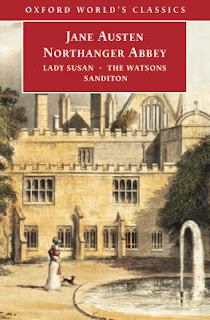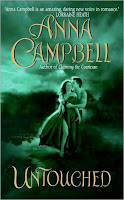 Welcome to day two of Jane Austen week! In honor of Jane Austen’s upcoming birthday, we’re spending this whole week talking about her novels.
Welcome to day two of Jane Austen week! In honor of Jane Austen’s upcoming birthday, we’re spending this whole week talking about her novels.
Today: Northanger Abbey!
I first read this novel in college. The only Austen I’d read before was Pride and Prejudice, and I’d found it wonderfully romantic. So I picked up Northanger Abbey one day. I was expecting an emotional, swoon-worthy, and delightfully short book. (I’ve always liked short books. Does that mean I’m lazy?)
The novel wasn’t quite what I was expecting. In fact, I was initially quite disappointed. I’d wanted a smart heroine (like Lizzy Bennet) and a powerful, yummy hero (such as Darcy).
 Instead, I got a staggeringly naive heroine. And, sure, naive heroines (particularly young ones) may transform themselves into impressive women, but it seemed to me that would require strength and intelligence, or at least industriousness. Catherine had no great claim to any of the three. No, her best quality was that she was, you know, nice. Pleasant. Friendly.
Instead, I got a staggeringly naive heroine. And, sure, naive heroines (particularly young ones) may transform themselves into impressive women, but it seemed to me that would require strength and intelligence, or at least industriousness. Catherine had no great claim to any of the three. No, her best quality was that she was, you know, nice. Pleasant. Friendly.
Gullible.
Tilney was a bit more attractive to my eighteen-year-old reading self, once I figured out that pretty much everything he said was a joke. But Austen refused to let me get romantic about Tilney, no matter how much I wanted to. Instead, she kept pointing out that one of the reasons he was falling for Catherine was that she quoted his opinions on art back to him:
…though to the larger and more trifling part of the [male] sex,  imbecility in females is a great enhancement of their personal charms, there is a portion of them too reasonable and too well informed themselves to desire any thing more in woman than ignorance.
imbecility in females is a great enhancement of their personal charms, there is a portion of them too reasonable and too well informed themselves to desire any thing more in woman than ignorance.
…she soon began to see beauty in every thing admired by him, and her attention was so earnest, that he became perfectly satisfied of her having a great deal of natural taste.
And that wasn’t what I was looking for in a guy, either in literature or real life.
And yet, when The Official Risky Decision was made to blog about Austen’s novels this week, my hand went up with an “oh, can I have Northanger Abbey, please please please?”
It’s definitely one of my three favorite Austens (along with P&P and Persuasion.) And I’m pretty sure I lean toward it more than the average Austen fan.
 So…what changed? Why do I love it now, when I was so disappointed at the outset?
So…what changed? Why do I love it now, when I was so disappointed at the outset?
I think one of the reasons is that I (extensively) revised my expectations. I no longer pick up the novel to have a wonderful romantic adventure, or admire a heroine or swoon over a hero.
I love the humor. The bright, sparkling, silly fun of the first half of the book is just great comedy. John Thorpe, always boasting… Isabella, so transparent in how she chases men… Mrs. Allen, who wishes she had some acquaintance in Bath… Mr. Tilney, who knows to what use ladies put nine-shillings-a-yard muslin.
And, really, what a lovely existence, in that first half of the book! The worst problems are rain and a bit of boredom, but Mrs. Radcliffe can always cure that. We have country dances and country walks, carriages and cravats, flirtation and quizzes — and no work at all. Ah, yes — that’s the life I want. (Does that mean I’m lazy?)
 I confess, I don’t care for the second half of the book nearly as well. Sunshiny, dynamic Bath turns into dark, dreary Northanger Abbey, and most of the comic characters are gone. Tilney lectures Catherine a lot, and the ending is one of Austen’s “I’ll tell you what happened, but I won’t give it to you in a scene” resolutions, like in Mansfield Park, which I always find less than satisfying.
I confess, I don’t care for the second half of the book nearly as well. Sunshiny, dynamic Bath turns into dark, dreary Northanger Abbey, and most of the comic characters are gone. Tilney lectures Catherine a lot, and the ending is one of Austen’s “I’ll tell you what happened, but I won’t give it to you in a scene” resolutions, like in Mansfield Park, which I always find less than satisfying.
But for me, nothing can equal the first half of the book. I want to be in Bath with the Tilneys and Thorpes and Allens, reading Gothic novels with Catherine and promenading in the Pump Room, with the comic spirit of Sheridan and the Eighteenth Century wits infusing everyone around me.
So…how about you? What do you think of Northanger Abbey?
(And remember, on Tuesday, January 1, we’re going to discuss the BBC TV adaptation of Northanger Abbey — so be sure to stop by!)
Cara
Cara King, author of My Lady Gamester, the story of a heroine who is so industrious that she makes me want to take a nap…then again, you all know how lazy I am…














